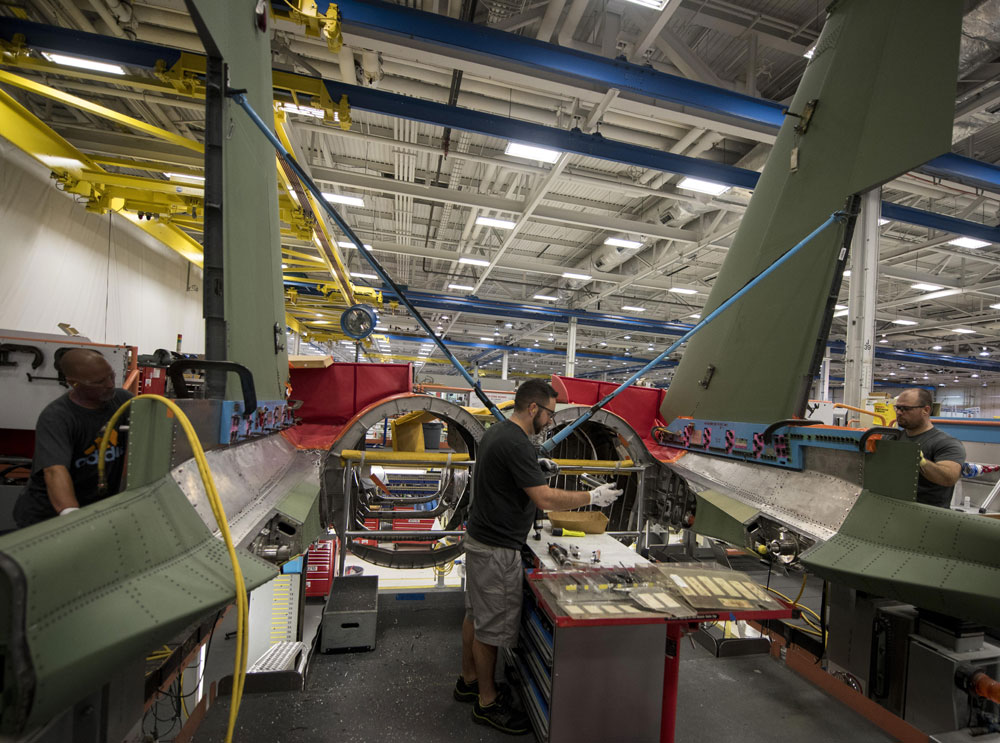
May 18, 2020; The Intercept
The COVID-19 pandemic has forced the nation to walk a tightrope. We have been asked to reconcile the interests of businesses and employees with stringent public health requirements needed to contain the spread of the novel coronavirus.
In some cases, as with systems that move food from farm to store to table, designating workers as essential has been uncontroversial, which doesn’t in the least excuse the often-inadequate protections that have cost over 100 grocery workers their lives due to COVID-19. Still, the designation of “essential” itself makes sense, as we all depend on grocery store shelves and food pantries being well stocked.
But what about the workers who build planes, missiles, and guns, often for customers overseas? As the US set its sights on fighting the challenge of COVID-19, the defense industry demanded an exception to public health efforts to limit the spread by keeping as many people at home as possible.
In a letter to the US Department of Defense, the Aerospace Industries Association pleaded their case. “We have seen state and local leaders impose a patchwork of controls that limit or even prohibit operations, and quarantine or otherwise impede the mobility of our workforce,” they write. “These actions threaten our ability to sustain our production of vital capabilities for the warfighter.”
To establish stability for our operations across the nation, the federal government should legally establish national security programs and our workforce as essential.
Sign up for our free newsletters
Subscribe to NPQ's newsletters to have our top stories delivered directly to your inbox.
By signing up, you agree to our privacy policy and terms of use, and to receive messages from NPQ and our partners.
And the Department of Defense agreed, giving workers in this field the requisite designation. The Intercept found workers being used to fulfill contracts for “$2.2 billion in possible weapons sales to India, Morocco, and the Philippines, and $150 million in blanket funds to the United Arab Emirates for order requisitions to repair and support aircraft fleets and do other related work.”
Although it is increasingly difficult to get good data on infection rates within specific places of work, the Intercept did find that those called back to work before testing and necessary preventative mechanisms could be put in place did become ill. “The prime contractor for the proposed missile sales to Morocco and India is a Boeing plant in St. Louis that had confirmed 15 coronavirus cases in late April.”
Declaring any worker essential should mean extraordinary commitments from their employers to minimize exposure and to have policies in place to protect them and their families should they fall ill. This bargain has not been honored; as with many other industries, defense workers have been left to protect themselves.
Workers at the General Electric plant in Lynn, Massachusetts…have been fighting for additional protections and support since the pandemic started. They’ve held numerous demonstrations, including a strike on April 8, and have a standing petition demanding that GE “fix appalling safety conditions at the facility and allow workers to manufacture the life-saving ventilators the whole country so desperately needs.”
There is some rich irony here. After all, defense contractors are supposed to be in the business of protecting national security. But the main national security threat currently is the pandemic itself, which is worsened by keeping the plants open.
As the president and his administration tip the balance to favor economic interests over public health, more and more people will be asked to come back to work, a message delivered by well-funded lobbyists, and too many will be called upon to discount the health risk and go back to business as usual. In the absence of firm and clear safety guidance, workers will need support as they demand employers do the right thing and that legislators put policies in place to protect them.—Martin Levine













